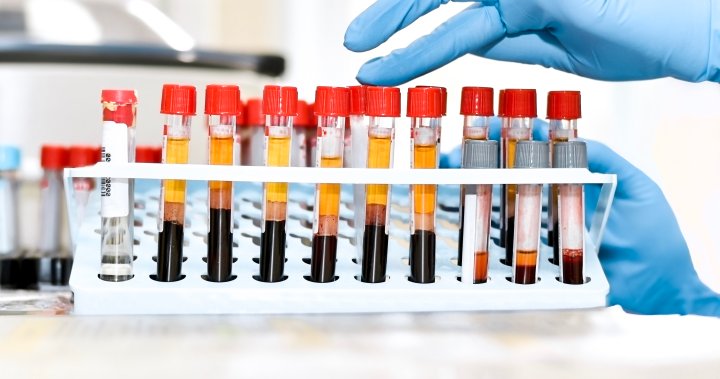A simple blood test has the potential to accurately screen for Alzheimer’s disease before symptoms start to show, according to a recent study.
The study, published in JAMA Neurology Monday, found the blood test can identify key plasma biomarkers for Alzheimer’s disease, with up to 97 per cent accuracy.
“Plasma biomarkers have emerged as important tools for Alzheimer’s disease evaluation,” the team of researchers from the University of Gothenburg in Sweden wrote in the study.
“Use of a blood biomarker is intended to enhance an early and precise Alzheimer’s disease diagnosis, leading to improved patient management and, ultimately, timely access to disease-modifying therapies.”
More than 600,000 people in Canada are living with dementia, according to the Alzheimer’s Society of Canada (ASC). By 2030, nearly one million people in Canada are forecast to live with the cognitive disease.
More than 25 diseases and conditions can cause dementia, but Alzheimer’s disease is the most common.

The typical indicator of Alzheimer’s in the brain is the buildup of the proteins phosphorylated tau (p-tau) and abnormal amyloid, explained Dr. Roger Wong, a clinical professor of geriatric medicine at the University of British Columbia.
Scientists use these biomarkers as a tool for early diagnosis and monitoring, to tell whether there is a high likelihood of having the disease, he said.
“This particular study is trying on an experimental basis to look at using a blood test to identify the p-tau in the blood,” he told Global News. “And specifically, trying to compare that kind of method with more traditional methods.”
To help detect early signs of Alzheimer’s, medical professionals traditionally use diagnostic tools like MRIs, PET scans or spinal taps. However, these diagnostic tools can be expensive, invasive and not readily available, Wong said.
But a simple blood test means more people could access it, the study’s authors said.
‘High accuracy’ blood test
The ALZpath ptau217 test, developed by the U.S.-based company ALZpath, works by identifying the protein p-tau217 in the blood (a biomarker for Alzheimer’s). In the study, the researchers used this test to assess its accuracy and compare it with the reliability of brain scans and spinal taps.
Get the latest Health IQ news.
Sent to your email, every week.
The researchers then looked at data from three trials in the United States, Canada and Spain conducted over eight years. It involved 786 people with and without cognitive impairment. The researchers analyzed the participants’ data from February 2023 to June 2023.
In each of the trials, patients underwent either a spinal tap, MRI or PET scan to identify plasma biomarkers associated with Alzheimer’s disease. The team then compared the findings with results from the ALZpath blood test.
A spinal tap, also known as a lumbar puncture, involves taking a sample of cerebrospinal fluid (CSF) by inserting a thin needle into the spinal canal. Brain scans like MRIs and PETs involve using radioactive or magnetic fields to create detailed images of the brain.

“High accuracy” was observed in identifying plasma biomarkers using the blood test, the study said.
The blood test accuracy in identifying Alzheimer’s was comparable to spinal tap measures and “superior to brain atrophy assessments” (such as MRIs), the authors stated.
The researchers concluded that while blood tests have shown promise as a diagnostic tool for Alzheimer’s disease, “their widespread evaluation has been hindered by the limited availability of commercial tests.”
The ALZpath ptau217 test is only available for research purposes at the moment, according to the company. The cost of the test ranges from US$200 to $5oo.
Although it is currently used only for research, the company told Global News in an email Tuesday that it is “in discussions with the labs in the U.K. to launch for clinical use as well later in 2024.”
Although the study provides “hopeful” news to the Alzheimer’s community, Wong cautioned that it comes with “limitations.”
“The findings are promising,” he said. “I used the word promising because the study would indicate that they can accurately identify the amount of these abnormal p-tau proteins present.”
The limitations Wong pointed to include the study’s “relatively small sample size” and the lack of diversity among participants, in terms of representation and background, making it less reflective of the real world.
For example, a study published Monday by the ASC found that ethnic and racial diversity impacts someone’s chances of developing dementia. It found that by 2050, one out of every four people who develop dementia in Canada will be of Asian origin. That is an 85 per cent increase from 2020.
Given the study’s limitations, Wong believes that further research is needed to explore these findings in greater depth.
“I think it’s really early, very experimental. I think this will hopefully, motivate more researchers across Canada and around the world to do more research and to have a better understanding,” he said.
“Overall, I remain hopeful when I see these kinds of studies. They are not definitive and not available for routine clinical use at this point, but I’m hopeful.”
Why early diagnosis is important
Early diagnosis of dementia is crucial as, during the initial stages of Alzheimer’s, medications and therapies have the potential to reverse or slow down some of the effects, according to the ASC.
Getting an early diagnosis is particularly beneficial as it enables patients to receive the necessary support, the ASC said. The organization said this includes treatment options that can reverse or slow down symptoms, alternative therapies and the opportunity to participate in clinical trials and research, contributing to improved diagnosis and enhanced care.
A study published by the ASC Monday found that a growing number of Canadians are developing dementia in their 60s, 50s, 40s and even earlier, and experts are not sure exactly what is behind the worrisome rise.
Growing evidence also shows that brain changes that result in dementia can begin 25 years before symptoms appear, the ASC stated.
While the causes of dementia are not fully understood, and there is currently no cure, there are available treatment options.
“There’s no single test per se, whether it is a blood test or a particular imaging test that would definitively tell us whether someone has dementia,” Wong explained.
“It is a clinical diagnosis, which means it is a combination of the medical story, the history, some of the physical assessment, physical examination findings, cognitive assessment, imaging studies.
“So there are different tools that are necessary. And again, we’re still in early days of developing the toolbox.”




